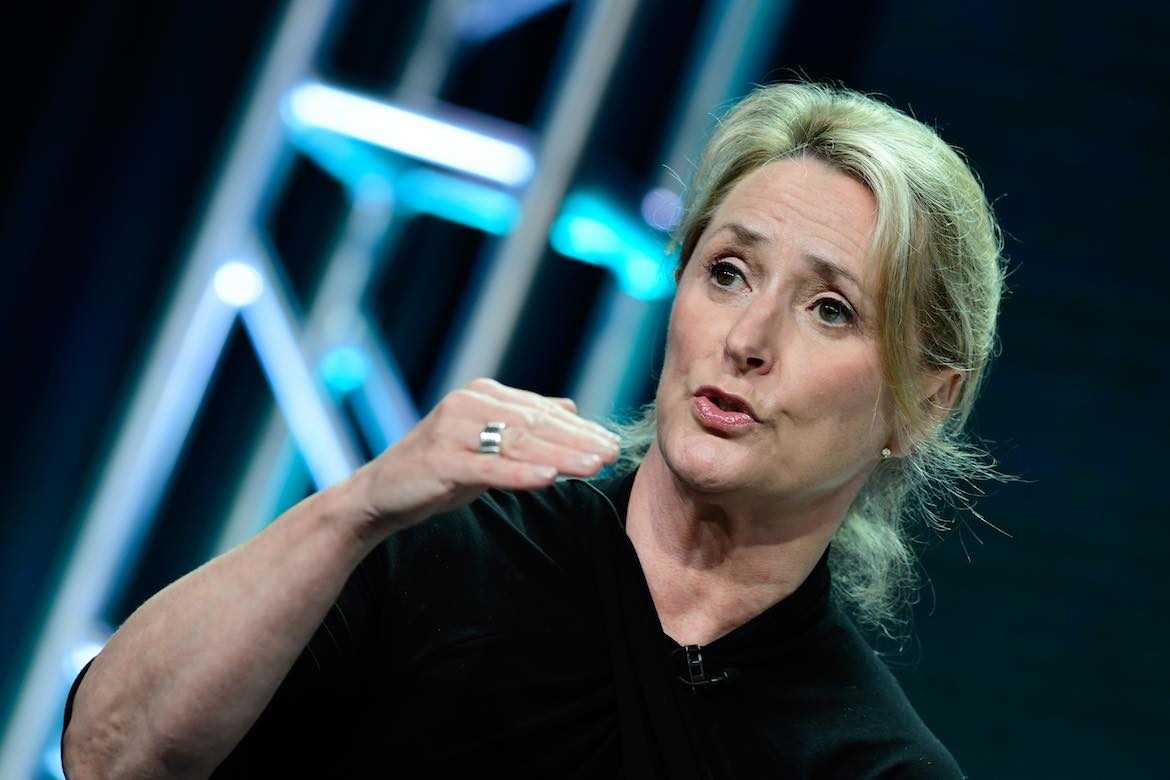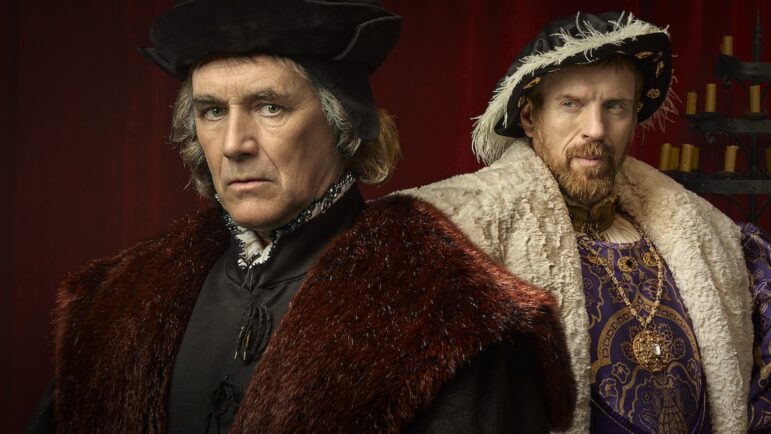Susanne Simpson leans into EP role at ‘Masterpiece’

Rahoul Ghose / PBS
Simpson speaks during a “Masterpiece” session at the Television Critics Association Press Tour in July 2018.
For much of its 53-year broadcast run, Masterpiece had a monopoly on British costume dramas. But as cable companies and streamers caught on to how popular the genre could be with American viewers, producers of the PBS staple have had to learn to compete.
Now under Susanne Simpson’s leadership as head of scripted content and EP, Masterpiece met the challenge of the streaming era by getting in early on the commissioning and development process. Instead of optioning completed series from U.K. studios, Simpson now works with producers from the inception of projects to exert more influence over scripts, development and casting.
“The market has changed,” Simpson said as she reflected on her five years as EP of the series. “And the problem is that many of the shows that we would like to have were being done with the streamers.”
In her previous role as deputy EP, Simpson was widely credited for the Masterpiece hit Downton Abbey, the most-watched drama in PBS history. Over its phenomenal run from 2011 to 2016, the series showed how a bingeable serial British drama can grab, hold and build audiences while amassing the revenues that attract new creative talents.
In his 11 years as VP of national programming at Boston producing station GBH, John Bredar has observed “a complete shift from what was a relatively open field in terms of competition,” he said. “In some ways, we were a little bit of a victim of our own success with Downton Abbey. It clearly showed that there could be a very significant appetite for costume. And suddenly, that became a very busy field.”
Sensual but not steamy
Along with the intensifying competition for programming, the rules have changed. Streamers and premium cable stations can handle far racier fare. The steamiest scenes on Bridgerton (Netflix), Harlots (Hulu), or Mary & George (Starz) don’t work for public television.
“Public broadcasting has certain standards, basically aligned with FCC guidelines,” Bredar said. “And then, on top of that, there’s an awareness of your audience’s sensibility.”
Both Bredar and PBS Chief Programming Executive Sylvia Bugg said Masterpiece viewers expect romantic scenes that are sensual but not explicit.

“You can have great storytelling and do it in a responsible, respectful way,” Bugg said. “Scenes can be warm without being hot and steamy. The actors can be dressed and still reflect human relationships and tell compelling stories.”
“That has been a very productive relationship in trying to figure out, well, how do we not go as far as Bridgerton, which wouldn’t be a very Masterpiece approach, but far enough to feel like we’re not still producing programming from a decade ago?” Bredar said. “Tom Jones is a great example where they worked hard to figure out, ‘OK, how would this character work historically?’ You’re trying to ground things in the period with a certain level of accuracy. This is a trademark of Masterpiece.”
Modern scenarios for literary classics
Bredar and Bugg credit Simpson with successfully meeting the moment, which also means diversity in casting.
In the U.K., colorblind casting became a trend over the last four or five years, Bredar said. He noted Simpson’s prescience in hiring Sharon Johnson, who holds a doctorate in race and gender issues, to consult on scripts.
Among the projects Johnson worked on is Tom Jones, the 2023 series in which the white title character’s love, Sophia Western, is Black. It’s explained that she’s the daughter of a Jamaican plantation owner and a slave, which works for the story.

“Susanne has, partly by grit and partly because she’s just very good at pivoting into a modern scenario, managed to get us positioned very effectively,” Bredar said. He pointed to upcoming programs such as Miss Austen and The Forsyte Saga as examples of “where we’ve really had to take the lead.”
“That’s been a way for us to get ahead of it, get upstream, and get involved in projects early, develop them and then carry it all the way through,” he said.
‘We compete for attention’
Having worked on Masterpiece for over 20 years under recently retired EP at large Rebecca Eaton, Simpson is only the fourth EP in the show’s history. She’s keenly aware of its history, which includes 83 Emmy Awards.
“The thing that drives me is that I understand how important Masterpiece is to our viewers and PBS,” Simpson said. “And what I hope I’m doing, in offering my creative contributions, is taking us to a new place in terms of actual original programming.”
At the forefront of her mind are projects that will resonate in the now-crowded costume-drama field. Simpson is especially on the lookout for limited series with potential to become “tentpoles with cast members that our audience would love,” she said. “And that the critics would write about — because we don’t just compete for programs, we compete for attention. That’s hard when Netflix might drop 30 new hours in a month.”
Tom Jones, for example, was a tentpole with Hannah Waddingham (Ted Lasso) as Lady Bellaston. Waddingham “was very popular at that particular moment,” she added. Wolf Hall: The Mirror and the Light, starring Mark Rylance and Damian Lewis, is another tentpole. That six-part series premieres March 23.
Colin Callender, who brings Wolf Hall back nine years after the first series, also produces All Creatures Great and Small, which launches its fifth season in January. Callender racked up 132 Emmy Awards when running HBO Films. He is blunt about how much he loves the Masterpiece experience.

“The thing I learned very early on in my producing career was that the casting of the finances is as important as the casting of the actors,” he added. “You need financers who really understand what it is you’re trying to do and embrace and support that. Masterpiece and Susanne do that every time.”
“What’s significant has less to do with how Masterpiece has evolved and more to do with the role it plays in the marketplace, which has changed fundamentally,” Callender added. Masterpiece has been “a consistent supporter of a certain type of intelligent, smart programming for grown-ups in a world which has sometimes forgotten how to produce programs for grown-ups,” he said.
‘Bullseye for her audience’
So many of those grown-ups love Regency Period gowns. Miss Austen, a four-part series debuting in May, is a new approach for delivering on that in a literary adaptation that’s timed for Jane Austen’s 250th birthday.

Christine Langan, a British producer and former BBC EP, optioned rights to Gill Hornby’s novel and approached Simpson about the project. “Susanne seemed to feel that Miss Austen was a bullseye for her audience,” she said.
“It’s rather special in the way it examines the life of Jane and her very special relationship with her slightly older sister, without whom she would never have had the writing career she had,” Langan said. “I imagine it’s the perfect Masterpiece vehicle.”
Another potential tentpole is The Forsyte Saga, a new adaptation of John Galsworthy’s trilogy of novels about a wealthy London lawyer and his initially unrequited love.
“We have found that the story, the themes, are as potent today as they were,” said EP Damien Timmer. Among the many adaptations of the novels, a 1967 BBC TV series was a big hit for U.S. public TV stations and predated the 1971 debut of Masterpiece.
Timmer, managing director of Mammoth Screen and EP of Tom Jones and Poldark, believes the best Masterpiece series share qualities. “They have the specificity of being about British culture, class, society, relationships,” he said. “But there’s a universality … that means that an American audience, a global audience, can lean in and find it interesting. Susanne and I talked for a long time about that. With Susanne — and this is not always true of other broadcasters — there’s never any sense she doesn’t think very highly of her audience and expects us to, too.”
Like Masterpiece viewers, Simpson loves literature and cinematic programs. That affinity shapes her understanding of what viewers want and what she hopes to accomplish next at Masterpiece.
“I certainly am so grateful for what Rebecca and all the other EPs have done to bring Masterpiece to this point, but I feel I have something to add,” she said.
“I feel like Lord Grantham, which is, I’ve just inherited the house,” Simpson said. “And my job is to keep it alive for the next generation.”





